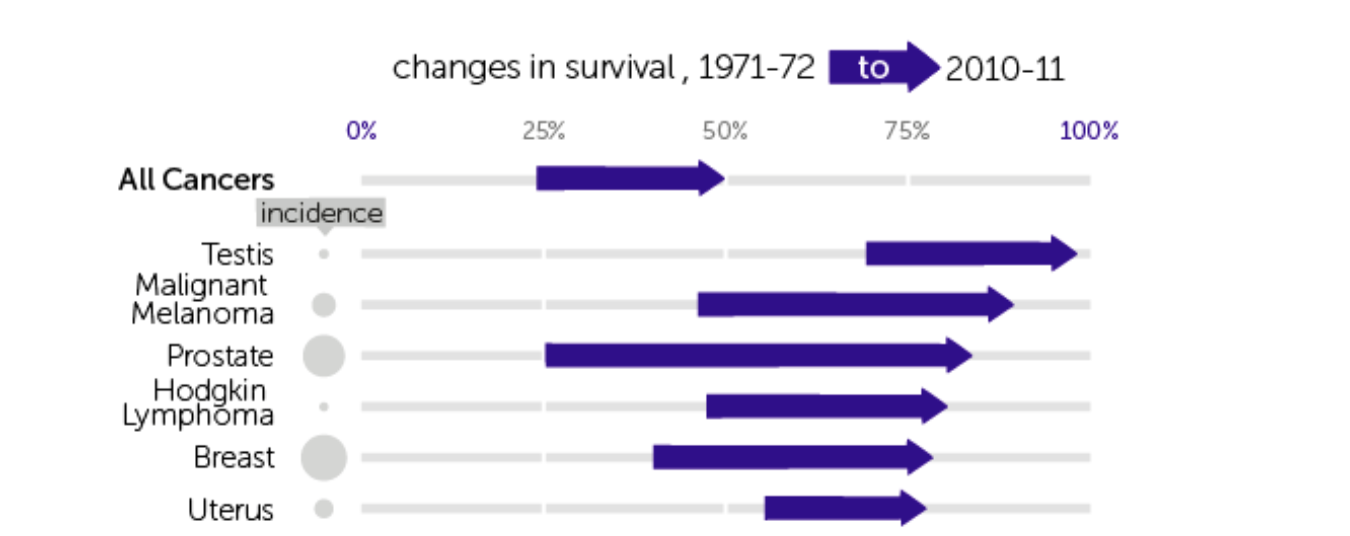There’s a lot of information out there about cancer. There’s also a lot of misinformation. Here’s a few common myths.
1. Sharks don’t get cancer
They do. The first known description of a shark tumour was actually over 160 years ago. Some sharks do appear to be less at risk of cancer, but to generalise and say “sharks don’t get cancer” is false.
This myth has led to people using shark cartilage supplements to try and cure cancer. This puts them at risk of side effects, and there is no good evidence that it works so if conventional treatment is delayed it could be very dangerous. It could also be contributing to the needless deaths of millions of sharks per year.
2. Cancer is a modern disease
The rate of people diagnosed with cancer is rising, that’s true. But that’s not because cancer is a modern-day disease. It was actually described by the ancient Greeks and Egyptians as far back as 3,000 years ago, and we have an ancient Egyptian skeleton with signs of bone cancer. We’ve even found evidence that dinosaurs had cancer.
The reality is that we’re living longer, and cancer is generally a disease associated with old age. So the fact that more people are living longer lives means the cancer rate rises. Think about it this way – we all die, so if other causes of death such as smallpox and polio are eliminated or reduced, something else like cancer will go up.
3. Cancer is a death sentence
Cancer survival rates are higher than ever. In the UK, the ten-year survival rate for all cancers has doubled from 25% in 1971-72 to 50% in 2010-11. Testicular cancer has the highest survival rate at 98%.
Higher awareness and modern diagnostic methods mean we can catch cancer early, which makes it easier to treat and oncologists now have more options than ever to choose from when treating a patient with cancer.
In fact, we’re so good at detecting cancer now we’ve given ourselves a new problem – overdiagnosis. This is when a cancer is diagnosed which may actually be so slow-growing that the patient would die with it rather than of it, meaning any treatment may actually reduce quality of life for no real benefit.
4. Cancer is a single disease
This one is really common. It’s understandable, really – we call it all cancer, so it seems intuitive that all cancers are at least somewhat similar.
In reality, there are hundreds of different types of cancer, and they have different strengths and weaknesses. Some are slow-growing, others are aggressive. Some respond well to treatment, others are harder to treat. Some respond to certain treatments whereas the same treatment may have no effect on another.
These differences are the big reason why it’s unlikely we’ll see a single “cure for cancer”. It’s handy in everyday speech to group them together, but in technical terms they’re very different.
5. Cancer is wholly preventable
Some people believe that you can avoid cancer by eating special diets, taking supplements or avoiding certain activities. This is problematic because if all cancer is preventable, the implication is that the people who do get cancer must be somehow to blame.
It’s estimated that somewhere between 30 and 50% of cancers are preventable through actions like not smoking, eating healthily or taking regular exercise. But that still leaves 50-70% of cancers that would not be preventable. Sometimes you just get unlucky, sadly.
On the topic of reducing cancer risk, it’s important to distinguish between relative and absolute risk. Media stories often have headlines like “thing raises cancer risk by 50%”, which sounds like a huge increase in risk but it’s a relative risk and only tells half the story.
If the rate of that specific cancer was two cases per 100,000 people, a 50% increase would be three people per 100,000. So the absolute risk has increased from 0.002% to 0.003%, or one person per 100,000. You may decide that 0.001% absolute risk increase still isn’t worth it, but it’s a much more nuanced decision than the headline implies.
So, now you know a bit more about these common myths, please speak up when you see them being propagated. Most people mean well, but it’s important we make sure our energy is properly directed if we’re to keep making progress.
If you want to know more, there are some excellent resources available at Cancer Research UK and the National Cancer Institute.
This article was written as part of my November writing challenge, a NaNoWriMo-inspired attempt to write one short, snappy article a day in November. Please excuse brevity, but let me know if I’ve missed anything important!

